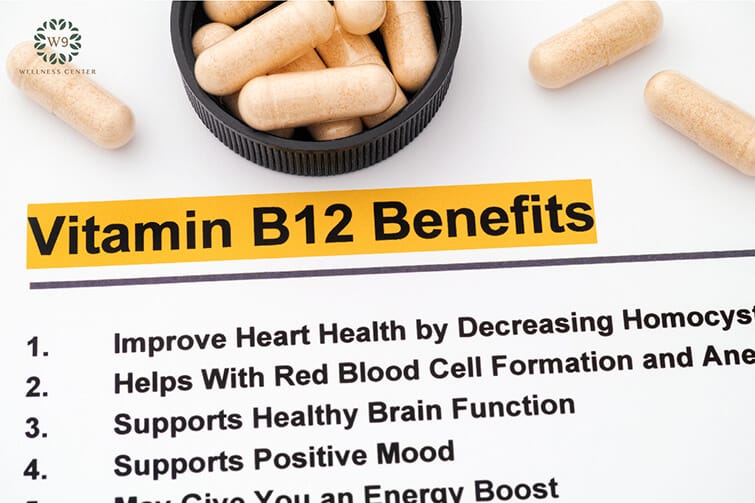
Vitamin B12 is an important nutrient.Essential for the functioning of various systems in the body Especially the brain, nervous system, and red blood cell production. IncludingDNA stabilization At the cellular level, vitamin B12 also plays a role inControlling homocysteine levels (Homocysteine) which is related to inflammation of blood vessels, risk of heart disease and stroke.Vitamin B12 deficiency can lead to health problems. In the short term, it can cause problems such as fatigue and memory loss, and in the long term, it can cause problems such as stroke and neurological diseases. Therefore, understanding the sources, benefits, and ways to maintain normal vitamin B12 levels is at the heart of preventative medicine and anti-aging medicine.
Vitamin B12 or cobalamin is a water-soluble vitamin that is essential for
Vitamin B12 in natural foodsIt is usually attached to animal protein. When eaten, itHydrochloric acid must be used. and sufficient gastric protease To separate vitamin B12 first so it can be absorbed into the body.
“Vitamin B12 deficiency is common in the general population, especially among the elderly and those following a strict vegetarian diet.”
Getting enough vitamin B12 affects your health in many ways, such as:
Our bodies cannot synthesize vitamin B12 on their own. We need to get it from food or dietary supplements. Food sources rich in vitamin B12 include:

Although most people get vitamin B12 from the foods they eat, certain groups of people may be at higher risk of vitamin B12 deficiency, including:
Framingham Offspring Study (2000) It was found that even the working-age group (aged 26–49 years) had a B12 deficiency rate similar to that of the elderly. [1]
If the body lacks vitamin B12, it may manifest through a variety of physical and neurological symptoms, which can be divided into 4 main groups of symptoms as follows:

Immunity Destroys parietal cells in the stomach, reducing acid secretion. Decreased absorption of vitamin B12 (Malabsorption) is insufficient for red blood cell production. Leading to anemia Which, in addition to the symptomschronic fatigueIn addition to the lack of oxygen at the cellular level, there may also beNeurological symptoms For example, you may hear strange sounds in your ears (Tinnitus). [3]
B12 deficiency affects thinking, memory, cognition, and brain performance. (Cognitive functions) It is also associated with neurodegenerative diseases such as dementia and Alzheimer's, and is associated with higher levels of Homocysteine. [5] Supplementing vitamin B12 deficiency in people can help improve cognitive function in patients. [6]
Elevated homocysteine levels are also an important independent risk factor for cardiovascular disease. [7] Which is a disease thatHas the highest mortality rate today Although various prevention trials have come to different conclusions regarding vitamin B supplementation for the prevention of major cardiovascular events and the reduction of total mortality rate, But the American Heart Association concludes that there is sufficient evidence to support the use of B vitamins to reduce the risk of cardiovascular disease. (The American Heart Association has concluded that the available evidence is adequate to support a role for B vitamins in reducing cardiovascular risk) [7]
Vitamin B12 deficiency makeNeurological symptoms occurAvailable in a variety of formats, including:Numbness in the hands and feet from neuropathy (Peripheral Neuropathy) Pain in the 5th facial nerve (Trigeminal Neuralgia) or even strange facial nerve pain in various locations and symptoms (Isolated Facial Neuralgia), including dull pain (Dull Pain), sharp shooting pain (Sharp Shooting) and pain that moves and changes places (Fleeting). [4]

Blood vitamin B12 testing (Serum B12 Level) is a commonly used method, but its accuracy is not very high because it cannot clearly tell whether the body has enough B12 at the cellular level.
In addition, even the level check Homocysteine This will give a clearer picture, but it is not specific to vitamin B12 deficiency. It can also be caused by folate or vitamin B6 deficiency. The most reliable and accurate method is to check the levels.Organic acid Methylmalonic acid Because it reflects the true functioning of cells (Functional indicator of tissue level deficiency) [8,9]
As per the advice ofNational Institutes of Health (NIH) The recommended daily intake of vitamin B12 is:
For those at risk of vitamin B12 deficiency For example, the elderly, those with absorption problems, or those who follow a strict vegetarian diet may need to take vitamin B12 supplements orConsult a specialist for further advice on choosing the right supplement dosage for each individual.
Vitamin B12 plays an important role in promoting health and preventing disease, including:
Helps reduce the risk of cardiovascular disease: Reduces blood levels of homocysteine, a risk factor for heart disease.

Getting adequate and consistent vitamin B12 can significantly improve your long-term quality of life.
so Maintaining proper Vitamin B12 levels not only helps boost energy and immunity, But it still plays an important roleLong-term prevention of neurodegenerative diseases, heart disease and blood vessels
If you have risk factors, you should have regular checkups and consult your doctor for appropriate treatment.
Praram 9 Hospital (3rd floor, Building A)
Dr. Araya Damnernsawad (Dr. Am)
Anti-aging and preventative medicine physician
W9 Wellness Center
References:
Herpes vs. Shingles It is a disease caused by a viral infection. A group called Herpes virus
Can't find it in this world. That is, you can't go anywhere to find food. Because it is what a mother gives to her child. It is the last treasure from our own body to be given to our children.
Hormones are considered the key to the body. Because when the body or one of the hormones in the body is out of balance It will affect every system in our body. Whether it's insomnia